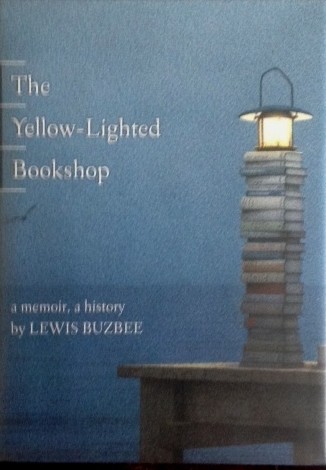Inspiring Older Readers
 posted on 13 Oct 2021
posted on 13 Oct 2021
The Yellow-Lighted Bookshop by Lewis Buzbee
I’m a big fan of books about books – especially ones that deal with the whole rigmarole of book collecting and the joy of visiting bookshops. If you share that passion, you’ll struggle to find a more compelling and congenial book that Lewis Buzbee’s The Yellow-Lighted Bookshop.
It’s a book that falls almost neatly into two halves – the first half being very much of a memoir about how a young boy became a self-confessed book addict; and the second part a more studied, studious even, history of the evolution of bookshops as cultural venues.
The memoir is jam packed with observations that resonate with my own experiences. Buzbee, like me, was not a big reader until his middle teens when the book-thing grabbed him and wouldn’t let go. His desire to be constantly around books led him into nagging the manager of his local Californian bookshop, Upstart Crow, to eventually give him a job working there and, working night/evening shifts with Greta, another hippyish book fanatic, he learned the ropes of the book business and developed a real loyalty to the shop that gave him his first break.
But the reality the world over is that working in bookshops is a pitifully lowly paid occupation and when the chance came along for both he and Greta to earn more and work in the bigger, more prestigious, Printers Inc., he took it:
“It was pretty amazing. Greta and I had been to great bookstores together – the Bay Area, then and now, was chock-a-block with them – but what most swayed us about Printers? We’d been asked to help build this city of books.”
The final step in Buzbee’s book selling career evolution was to step into the role of publisher’s rep., going from bookshop to bookshop with the latest titles, getting advanced orders, chewing the bookish fat with the shop owners and workers.
“The work of being a sales rep is mostly in the talking. Here’s a book, here’s what its about, how many can I put you down for? Depending on the book and the buyer, this can be a lot of fun. Or not. A certain monotony can set on: it all depends, in the end, on how much you like to talk, and your ability to repeat yourself without going crazy.”
But, as this extract may suggest, it’s not a job you can do for any great length of time and stay fresh and grounded and for Buzbee the end came after seven years when he felt he had to come in off the road.
The end of his sales rep career brings the autobiographical content pretty much to an end and we move into the discursive history of bookshops – chapters that are brief but well researched and informed and which include excursions into issues such as censorship, the nature of the bookshop business model and the inevitable issue of new technology and the challenge it represents for physical shops.
The book was published in 2006 – pretty much the apex of ‘the internet will kill off all bookshops’ mania. To Buzbee’s enduring credit, he resists the temptation to drift down the doom-monger path and he makes a stand for the idea that people will always want bookshops filled with physical books. The nature of bibliophilia means that there will always be poor saps like me (and Lewis Buzbee) who will always want to spend unfeasible amounts of time in bookshops – even if they paid their last visit only the day before:
“This rainy afternoon my wife and daughter are out of the house and I’ve got a few hours to kill……….What better place to enjoy the stretched hours than a book store. I pop around the corner to our local store, which I’ve already scoured twice in the past three days, but it seems worth another try, and besides, the weather is perfect for it. I may be in the store for five minutes or an hour, it doesn’t really matter. I do know that I’ll leave with some book and head home to spend hours, both lost and found, in the perfect solitude of my sagging green easy chair.”
Paperback copies of the book are easily available online for well under £10 and, if you want hardback, you wont pay a lot more.
Terry Potter
October 2021